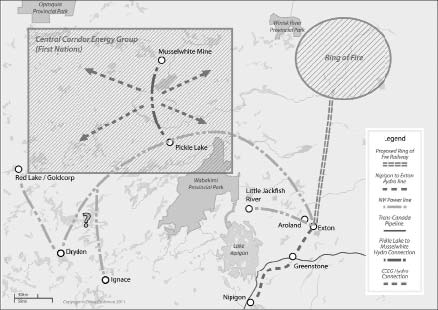Discovery of the massive “Ring of Fire,” a chromite-rich mineral deposit in a remote area of northern Ontario, is the first and perhaps easiest step in realizing the site’s potential.
Mining the ore and transporting it across the Hudson Bay Lowlands will be challenging from an environmental and engineering standpoint.
Greater still is the challenge and responsibility of using this resource in a way that advances the economic and social needs of our First Nation peoples whose traditional and reserve territories stand to be significantly impacted.
The First Nation peoples living in the area have made it clear that they expect minerals extracted from their traditional territories to be refined nearby.
Early this fall, the Municipality of Greenstone released a discussion paper showing how the volume of electricity required by a ferrochrome refinery can be delivered to Exton Siding – which is near Nakina on the CN railway, adjacent to the Aroland First Nation and within Matawa’s traditional land base – in a cost-effective and environmentally sustainable way.
This “Made-in-Greenstone” approach is also being called the “Northwest Ontario Kick-Start” proposal. The discussion paper was consciously designed to maximize the social and economic progress for all northwest Ontario residents. This is accomplished by proposing an electricity grid strong enough to serve Ring of Fire refining demands, provide electricity to support mining and forestry operations, and transition First Nations communities off diesel-generated power.
Locating the refinery at Exton – at the base of a proposed north-south transportation corridor by rail and road – means ore would be refined close to the mine site. This means lower transportation costs and related pollution. Refining ore close to the mine site minimizes environmental impacts, while maximizing social and economic benefit for those most impacted by mining activity.
We believe that the opportunity associated with developing the electricity infrastructure required to support a new mine site and refinery must be used to spark benefits across the region.
Our grid expansion proposal creates a loop that starts in Nipigon, goes through Nakina and picks up Little Jackfish en route to Pickle Lake. From there it connects to Ignace or Dryden.
As you can imagine, the proposal speaks to providing stable electricity in this broad zone. Communities as far apart as Greenstone and Red Lake would benefit. This includes First Nation communities and municipalities such as Greenstone, Sioux Lookout, Pickle Lake, Ignace, Dryden and Nipigon. We know that plentiful and reliable electricity would mean new economic opportunities through expansions and startups in the manufacturing, mining and forestry sectors across the whole region.
The made-in-Greenstone model offers First Nation communities new opportunities to promote renewable energy, such as the proposed Little Jackfish hydroelectric project, as well as wind and solar resources and ownership of transmission
lines.
If you are interested, please take the time to read the Northwest Ontario Kick-Start report on the Greenstone website at http://bit.ly/vnW31Y. We think you will agree that it offers a positive approach to processing the Ring of Fire minerals in an environmentally sustainable way, while providing the greatest economic and social benefit to the entire region.
– Renald (Ron) Beaulieu is the mayor of Greenstone, Ont. George Smitherman is a former deputy premier and energy minister in the Ontario government.


Be the first to comment on "Commentary: Unlocking the wealth of northern Ontario"